
Question Number 87194 by john santu last updated on 03/Apr/20
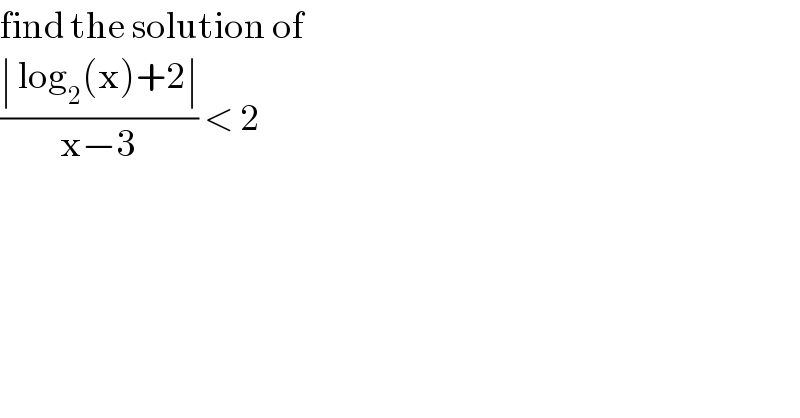
$$\mathrm{find}\:\mathrm{the}\:\mathrm{solution}\:\mathrm{of}\: \\ $$ $$\frac{\mid\:\mathrm{log}_{\mathrm{2}} \left(\mathrm{x}\right)+\mathrm{2}\mid}{\mathrm{x}−\mathrm{3}}\:<\:\mathrm{2}\: \\ $$
Commented byTANMAY PANACEA. last updated on 03/Apr/20

$${is}\:{it}\:\left(\mathrm{2}+{log}_{\mathrm{2}} {x}\right)\:\:{or}\:{log}_{\mathrm{2}} \left({x}+\mathrm{2}\right) \\ $$
Commented byjohn santu last updated on 03/Apr/20

$$\mathrm{2}+\:\mathrm{log}_{\mathrm{2}} \left(\mathrm{x}\right)\:\mathrm{sir} \\ $$
Commented byjohn santu last updated on 03/Apr/20

$$\mathrm{i}\:\mathrm{can}^{'} \mathrm{t}\:\mathrm{answer}\:\mathrm{that} \\ $$
Commented byjohn santu last updated on 03/Apr/20
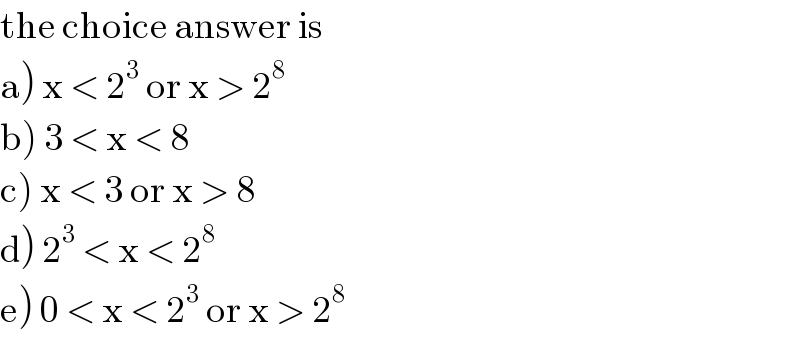
$$\mathrm{the}\:\mathrm{choice}\:\mathrm{answer}\:\mathrm{is}\: \\ $$ $$\left.\mathrm{a}\right)\:\mathrm{x}\:<\:\mathrm{2}^{\mathrm{3}} \:\mathrm{or}\:\mathrm{x}\:>\:\mathrm{2}^{\mathrm{8}} \\ $$ $$\left.\mathrm{b}\right)\:\mathrm{3}\:<\:\mathrm{x}\:<\:\mathrm{8} \\ $$ $$\left.\mathrm{c}\right)\:\mathrm{x}\:<\:\mathrm{3}\:\mathrm{or}\:\mathrm{x}\:>\:\mathrm{8} \\ $$ $$\left.\mathrm{d}\right)\:\mathrm{2}^{\mathrm{3}} \:<\:\mathrm{x}\:<\:\mathrm{2}^{\mathrm{8}} \\ $$ $$\left.\mathrm{e}\right)\:\mathrm{0}\:<\:\mathrm{x}\:<\:\mathrm{2}^{\mathrm{3}} \:\mathrm{or}\:\mathrm{x}\:>\:\mathrm{2}^{\mathrm{8}} \\ $$
Commented byjagoll last updated on 03/Apr/20

$$\mathrm{may}\:\mathrm{be}\:\mathrm{the}\:\mathrm{question}\:\mathrm{is}\: \\ $$ $$\mid\mathrm{log}_{\mathrm{2}} \:\left(\frac{\mathrm{x}+\mathrm{2}}{\mathrm{x}−\mathrm{3}}\right)\mid\:<\:\mathrm{2} \\ $$
Commented byjagoll last updated on 03/Apr/20
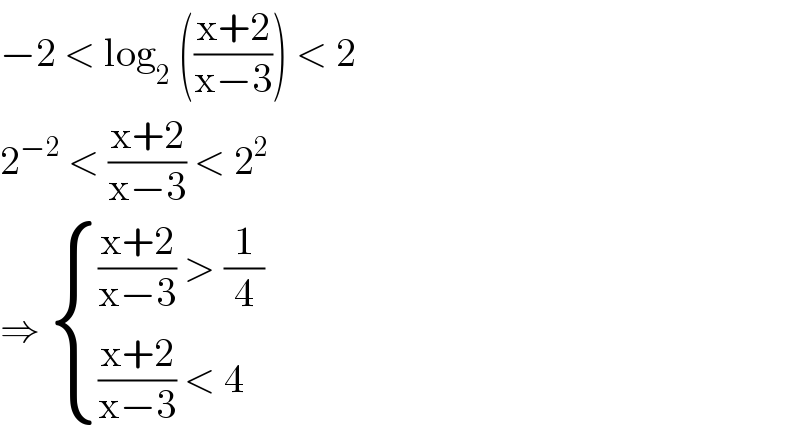
$$−\mathrm{2}\:<\:\mathrm{log}_{\mathrm{2}} \:\left(\frac{\mathrm{x}+\mathrm{2}}{\mathrm{x}−\mathrm{3}}\right)\:<\:\mathrm{2} \\ $$ $$\mathrm{2}^{−\mathrm{2}} \:<\:\frac{\mathrm{x}+\mathrm{2}}{\mathrm{x}−\mathrm{3}}\:<\:\mathrm{2}^{\mathrm{2}} \\ $$ $$\Rightarrow\:\begin{cases}{\frac{\mathrm{x}+\mathrm{2}}{\mathrm{x}−\mathrm{3}}\:>\:\frac{\mathrm{1}}{\mathrm{4}}}\\{\frac{\mathrm{x}+\mathrm{2}}{\mathrm{x}−\mathrm{3}}\:<\:\mathrm{4}}\end{cases}\: \\ $$
Answered by TANMAY PANACEA. last updated on 03/Apr/20
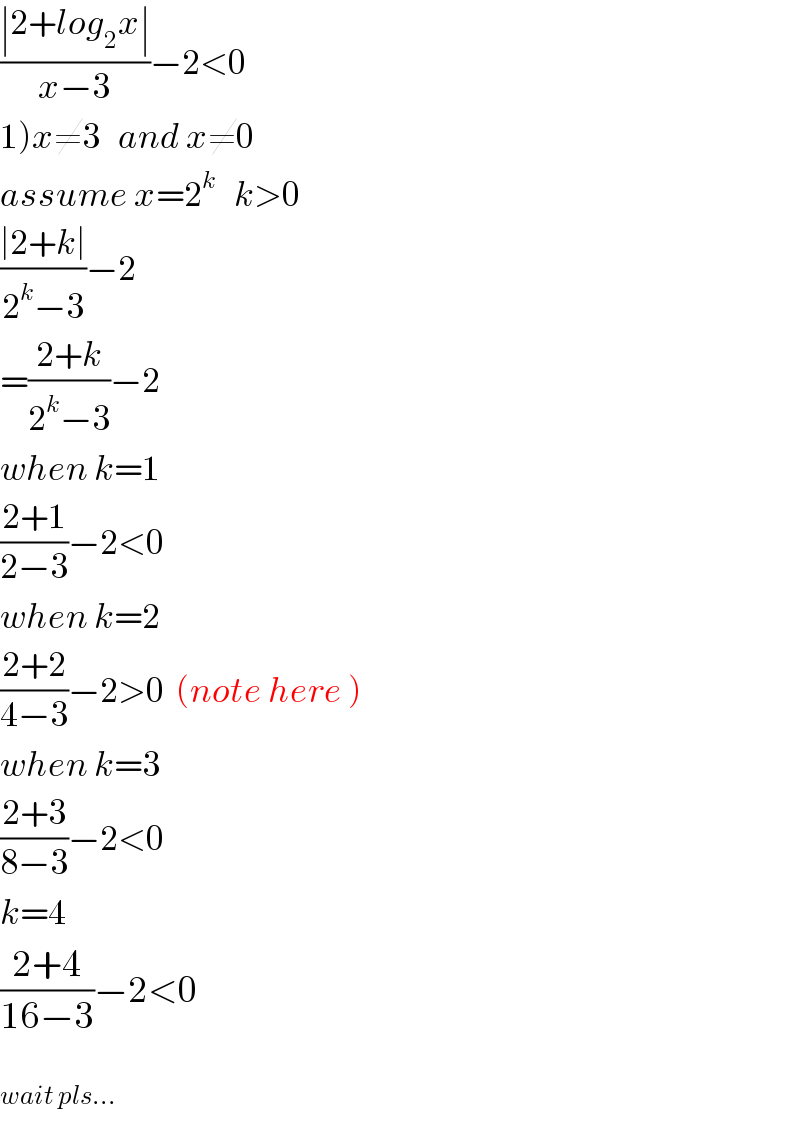
$$\frac{\mid\mathrm{2}+{log}_{\mathrm{2}} {x}\mid}{{x}−\mathrm{3}}−\mathrm{2}<\mathrm{0} \\ $$ $$\left.\mathrm{1}\right){x}\neq\mathrm{3}\:\:\:{and}\:{x}\neq\mathrm{0} \\ $$ $${assume}\:{x}=\mathrm{2}^{{k}} \:\:\:{k}>\mathrm{0} \\ $$ $$\frac{\mid\mathrm{2}+{k}\mid}{\mathrm{2}^{{k}} −\mathrm{3}}−\mathrm{2} \\ $$ $$=\frac{\mathrm{2}+{k}}{\mathrm{2}^{{k}} −\mathrm{3}}−\mathrm{2} \\ $$ $${when}\:{k}=\mathrm{1} \\ $$ $$\frac{\mathrm{2}+\mathrm{1}}{\mathrm{2}−\mathrm{3}}−\mathrm{2}<\mathrm{0} \\ $$ $${when}\:{k}=\mathrm{2} \\ $$ $$\frac{\mathrm{2}+\mathrm{2}}{\mathrm{4}−\mathrm{3}}−\mathrm{2}>\mathrm{0}\:\:\left({note}\:{here}\:\right) \\ $$ $${when}\:{k}=\mathrm{3} \\ $$ $$\frac{\mathrm{2}+\mathrm{3}}{\mathrm{8}−\mathrm{3}}−\mathrm{2}<\mathrm{0} \\ $$ $${k}=\mathrm{4} \\ $$ $$\frac{\mathrm{2}+\mathrm{4}}{\mathrm{16}−\mathrm{3}}−\mathrm{2}<\mathrm{0} \\ $$ $$ \\ $$
Answered by MJS last updated on 03/Apr/20
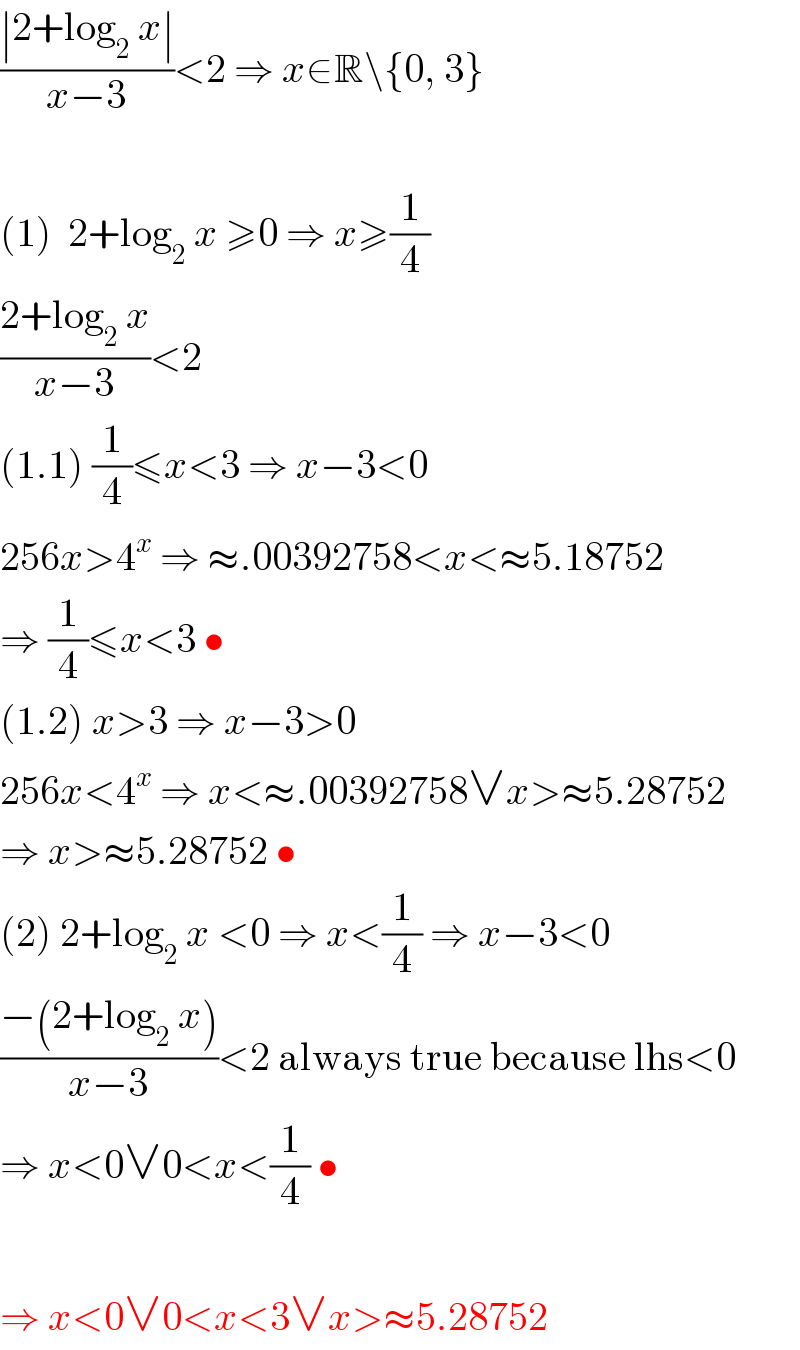
$$\frac{\mid\mathrm{2}+\mathrm{log}_{\mathrm{2}} \:{x}\mid}{{x}−\mathrm{3}}<\mathrm{2}\:\Rightarrow\:{x}\in\mathbb{R}\backslash\left\{\mathrm{0},\:\mathrm{3}\right\} \\ $$ $$ \\ $$ $$\left(\mathrm{1}\right)\:\:\mathrm{2}+\mathrm{log}_{\mathrm{2}} \:{x}\:\geqslant\mathrm{0}\:\Rightarrow\:{x}\geqslant\frac{\mathrm{1}}{\mathrm{4}} \\ $$ $$\frac{\mathrm{2}+\mathrm{log}_{\mathrm{2}} \:{x}}{{x}−\mathrm{3}}<\mathrm{2} \\ $$ $$\left(\mathrm{1}.\mathrm{1}\right)\:\frac{\mathrm{1}}{\mathrm{4}}\leqslant{x}<\mathrm{3}\:\Rightarrow\:{x}−\mathrm{3}<\mathrm{0} \\ $$ $$\mathrm{256}{x}>\mathrm{4}^{{x}} \:\Rightarrow\:\approx.\mathrm{00392758}<{x}<\approx\mathrm{5}.\mathrm{18752} \\ $$ $$\Rightarrow\:\frac{\mathrm{1}}{\mathrm{4}}\leqslant{x}<\mathrm{3}\:\bullet \\ $$ $$\left(\mathrm{1}.\mathrm{2}\right)\:{x}>\mathrm{3}\:\Rightarrow\:{x}−\mathrm{3}>\mathrm{0} \\ $$ $$\mathrm{256}{x}<\mathrm{4}^{{x}} \:\Rightarrow\:{x}<\approx.\mathrm{00392758}\vee{x}>\approx\mathrm{5}.\mathrm{28752} \\ $$ $$\Rightarrow\:{x}>\approx\mathrm{5}.\mathrm{28752}\:\bullet \\ $$ $$\left(\mathrm{2}\right)\:\mathrm{2}+\mathrm{log}_{\mathrm{2}} \:{x}\:<\mathrm{0}\:\Rightarrow\:{x}<\frac{\mathrm{1}}{\mathrm{4}}\:\Rightarrow\:{x}−\mathrm{3}<\mathrm{0} \\ $$ $$\frac{−\left(\mathrm{2}+\mathrm{log}_{\mathrm{2}} \:{x}\right)}{{x}−\mathrm{3}}<\mathrm{2}\:\mathrm{always}\:\mathrm{true}\:\mathrm{because}\:\mathrm{lhs}<\mathrm{0} \\ $$ $$\Rightarrow\:{x}<\mathrm{0}\vee\mathrm{0}<{x}<\frac{\mathrm{1}}{\mathrm{4}}\:\bullet \\ $$ $$ \\ $$ $$\Rightarrow\:{x}<\mathrm{0}\vee\mathrm{0}<{x}<\mathrm{3}\vee{x}>\approx\mathrm{5}.\mathrm{28752} \\ $$
Commented byMJS last updated on 03/Apr/20

$$\mathrm{even}\:\mathrm{if}\:\mathrm{the}\:\mathrm{question}\:\mathrm{is}\:\mathrm{wrong},\:\mathrm{we}\:\mathrm{can}\:\mathrm{solve}\:\mathrm{it} \\ $$
Commented byjagoll last updated on 03/Apr/20

$$\mathrm{but}\:\mathrm{x}\:<\:\mathrm{0}\:\mathrm{not}\:\mathrm{valid}\:\mathrm{sir} \\ $$ $$\mathrm{log}_{\mathrm{2}} \left(\mathrm{x}\right)\:\Rightarrow\:\mathrm{must}\:\mathrm{be}\:\mathrm{x}\:>\:\mathrm{0} \\ $$
Commented byMJS last updated on 03/Apr/20

$$\mathrm{you}\:\mathrm{are}\:\mathrm{right}...\:\mathrm{but}\:\mid\mathrm{2}+\mathrm{log}_{\mathrm{2}} \:{x}\mid\:\in\mathbb{R}\forall{x}\neq\mathrm{0}\:... \\ $$ $$\mathrm{I}'\mathrm{ll}\:\mathrm{look}\:\mathrm{into}\:\mathrm{this}\:\mathrm{again}\:\mathrm{later} \\ $$
Commented byMJS last updated on 03/Apr/20
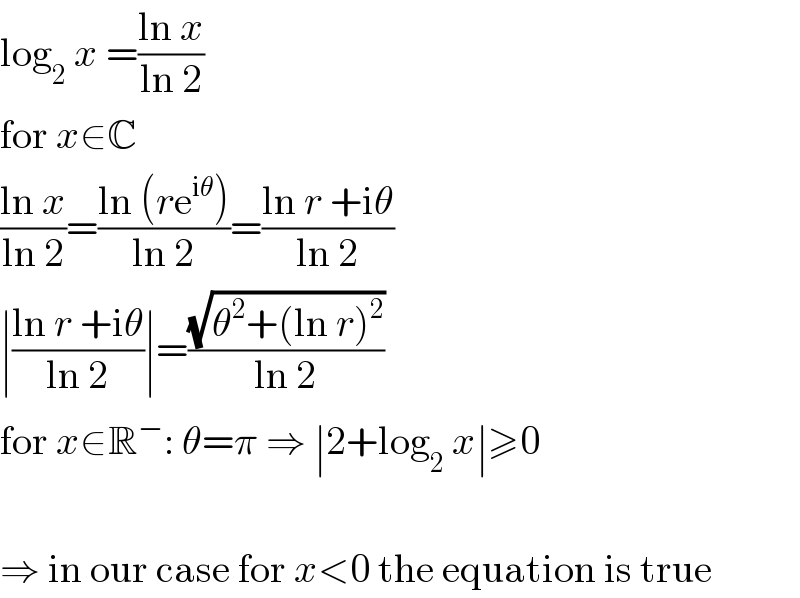
$$\mathrm{log}_{\mathrm{2}} \:{x}\:=\frac{\mathrm{ln}\:{x}}{\mathrm{ln}\:\mathrm{2}} \\ $$ $$\mathrm{for}\:{x}\in\mathbb{C} \\ $$ $$\frac{\mathrm{ln}\:{x}}{\mathrm{ln}\:\mathrm{2}}=\frac{\mathrm{ln}\:\left({r}\mathrm{e}^{\mathrm{i}\theta} \right)}{\mathrm{ln}\:\mathrm{2}}=\frac{\mathrm{ln}\:{r}\:+\mathrm{i}\theta}{\mathrm{ln}\:\mathrm{2}} \\ $$ $$\mid\frac{\mathrm{ln}\:{r}\:+\mathrm{i}\theta}{\mathrm{ln}\:\mathrm{2}}\mid=\frac{\sqrt{\theta^{\mathrm{2}} +\left(\mathrm{ln}\:{r}\right)^{\mathrm{2}} }}{\mathrm{ln}\:\mathrm{2}} \\ $$ $$\mathrm{for}\:{x}\in\mathbb{R}^{−} :\:\theta=\pi\:\Rightarrow\:\mid\mathrm{2}+\mathrm{log}_{\mathrm{2}} \:{x}\mid\geqslant\mathrm{0} \\ $$ $$ \\ $$ $$\Rightarrow\:\mathrm{in}\:\mathrm{our}\:\mathrm{case}\:\mathrm{for}\:{x}<\mathrm{0}\:\mathrm{the}\:\mathrm{equation}\:\mathrm{is}\:\mathrm{true} \\ $$
Commented byjohn santu last updated on 03/Apr/20

$$\mathrm{ooo}\:\mathrm{if}\:\mathrm{x}\:\in\mathbb{C}\:\mathrm{sir}.\: \\ $$ $$\mathrm{so}\:\mathrm{the}\:\mathrm{choice}\:\mathrm{answer}\:\mathrm{nothing}\:\mathrm{correct} \\ $$ $$\mathrm{sir} \\ $$
